Novosti
Pan-Slavic mission of Russia: “Soft” influence with the help of children, church, bikers and fake humanitarians
Russia maintains religious and cultural relations with the region through the Russian and Serbian Orthodox Church, thus deepening its influence. In their field activities the Associations of Russian-Serbian friendship from BiH mention the cooperation of two countries: Russia and Republika Srpska!?

After Serbia, the photo exhibition “Children of Donbas” started its tour through the cities of Bosnia and Herzegovina, more accurately of Republika Srpska, at the beginning of August. The photos of children caught in any war are always disturbing under condition, of course, that they are not in the service of manipulation.
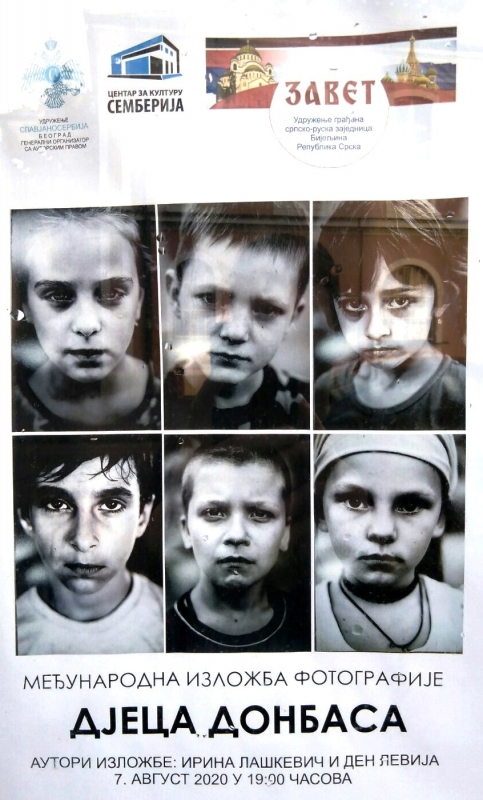
Exhibition poster
The content of the aforementioned exhibition is seriously problematic, since the organizers Association “Slavjanoserbija” from Belgrade and Serbian-Russian Community “Zavet” have just incidentally located the territory of Donbas as part of Ukraine.
The president of the Association “Slavjanoserbija”, Olga Milutinović, had found a parallel to the suffering of children in the conflict led by the Russian separatists in Donbas in the 1995 operation “Storm” (loc. Oluja) and the subsequent exile of Serbs from Croatia.
“The exhibition is the result of our cooperation with the associations in Russia, and this is about a part of Ukraine where we also have cooperation with their associations”, said Savo Cvjetinović, president of the Serbian-Russian Community “Zavet”.
“The cooperation” mentioned by Cvjetinović is organization of a rally in Višegrad, “Russian Volunteer Day”, honoring the Russian soldiers who fought along the Army of Republika Srpska from 1992 to 1995. The rally has been becoming increasingly used by the members of paramilitary, separatist pro-Russian groups from the Donbas region. They are recruiting volunteers from Serbia and Bosnia and Herzegovina to go to the battlefields in Donbas and “fight for Russia”.
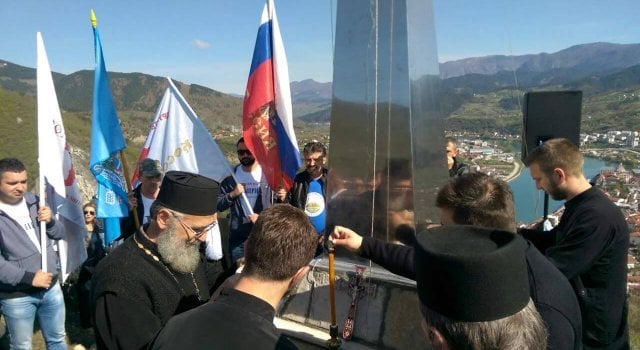
Monument to Russian volunteers in RS
The graveyard of Russian volunteers in Višegrad is the topic of yet another propaganda campaign of the local Pro-Russian activists. The documentary “Code of friendship”, winner of the competition “Orthodox initiative”, was premiered in the Cultural Center of the Eparchy of Zvornik and Tuzla in Bijeljina two years ago. The film follows children, 12 to 14 years of age, from Russia and Republika Srpska. As presented in the trailer the children “get to know the history and the culture of the brotherly countries”! Republika Srpska was, of course, presented as a country.
“I have seen so many hugs, smiles; the Russians felt at home here. There is no doubt that the children from Republika Srpska felt the same when they were in Russia. As regards the friendship, it is not built by the institutions, protocols and cooperation agreements, but it is built by living people, their efforts in joint art projects and experiences”, said on that occasion the Cultural Attaché of the Embassy of Russian Federation to BiH, Ana Ivleva.
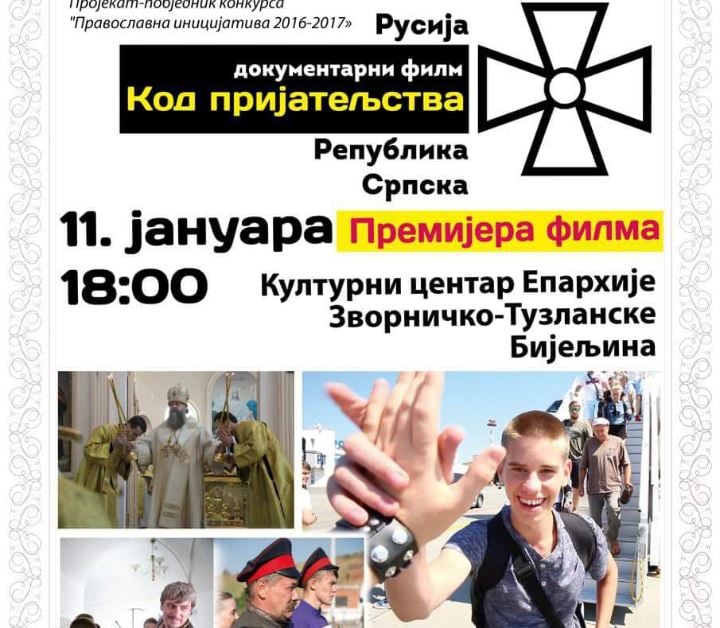
Poster – “Code of friendship” screening announcement
Aforementioned representatives of the Serbian-Russian Community “Zavet” from Bijeljina, as well as the elder of the Church of St. Panteleimon Bijeljina, archpriest Goran Nenić, travelled with the children to Russia.
The organizations that in addition to the promotion of Orthodox religion, Russian culture and language also cooperate with the paramilitary, nationalist and far-right organizations from Russia and other countries are involved in this “cultural event” of indisputable indoctrination of children.
The main propaganda message of these gatherings is the call to closeness of the Russian and Serbian people through Orthodoxy. The unity was particularly accentuated after the Patriarch Bartholomew of Constantinople granted autocephaly to the Orthodox Church of Ukraine, which angered the Russian Orthodox Church that was only supported by the Serbian Orthodox Church.
“Ukraine got its autocephaly, but at the same time the Russian Church has put forwards its candidate for the patriarch. The Serbian Church has sided with the Russian Orthodox Church on this matter and has become exposed to criticism of the most other churches. It did not happen in the past and a precedent was set that entirely obliterates Putin’s strategy of “Third Rome”. By the way, it was really interesting and amusing to hear the observation from the Serbian Orthodox Church that Bartholomew wants to make Third Rome out of New York. So, Serbia remained the only Russian island in the Balkans.
The island is exposed to an enormous and fierce influence that sometimes intimidates even the inhabitants of this country of seven million, who are frustrated about what to choose and “which geography” to follow, European or Asian. In its arsenal of persuasion in its grandiosity and superiority Russia, besides the church, has several other instruments that do not always succeed to mesmerize people, all due to lack of clarity of their public diplomacy”, explains sociologist Sead Pašić for Žurnal.
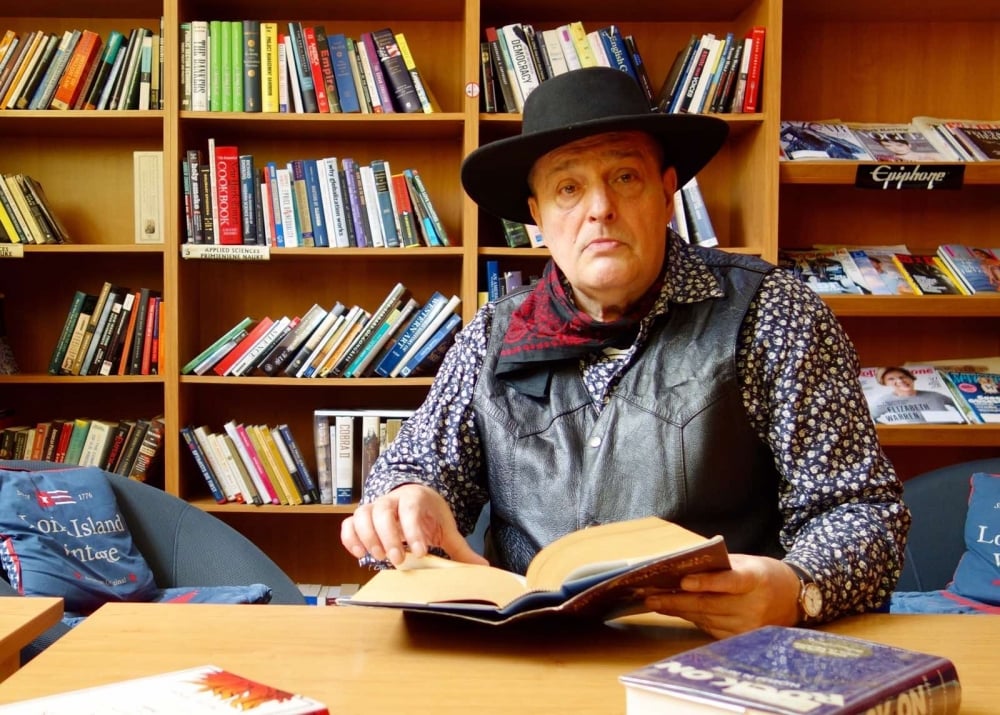 Sead Pašić
Sead Pašić
The Russian patriarch Kirill and the Russian President Vladimir Putin work in an “active and peaceful co-existence”. Putin is thankful for Kirill’s pre-election messages to the Russian Orthodox in which he underlined that believers can trust Putin. All of the above initiated the process of transferring the political and economic influence of Russian in the Balkans, which did not yield expected results, to the so-called “soft” influence through dissemination of Russian culture, particularly through the tradition of Orthodoxy.
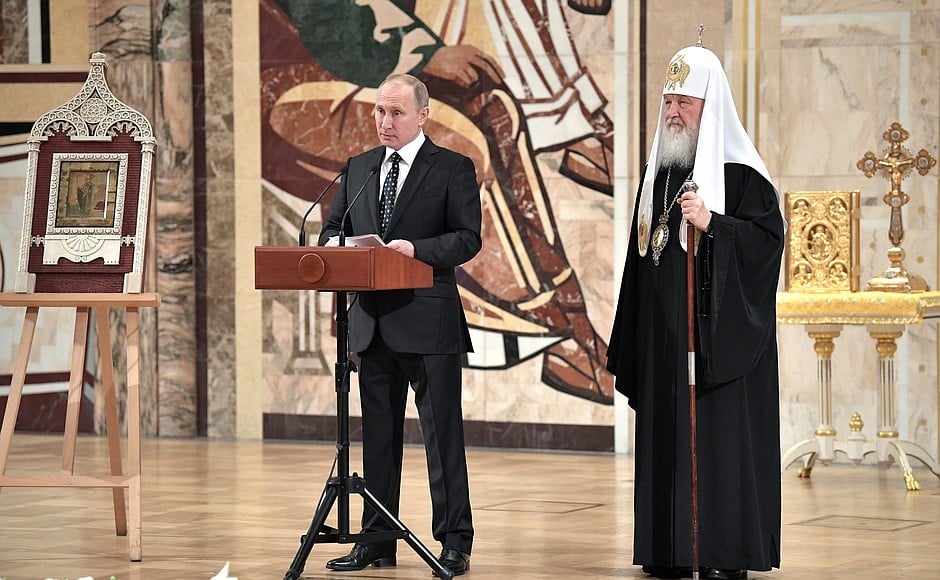
Vladimir Putin and Patriarch Kirill (right)
As Sead Pašić states it is a “democracy of religious ideology transfer that can be efficient, because religious doctrines and dogmatism are not questioned and it is used as a strong point for dissemination of political agenda.” When radical ideas, for which children are used, ran out, they reach for banal events such as “Russian-Serbian New Year’s Celebration” organized in Andrićgrad, “owned” by Emir Kustrica, who promotes establishment of cultural ties with Russia, particularly if it is financed by powerful Gasprom.
Embassy of the Russian Federation to Bosnia and Herzegovina intensively supports establishment of associations that promote ties with Russia, regardless of number of members. So was the establishment of the Association Serbian-Russian Friendship near Doboj supported, of which Žurnal wrote, followed by the establishment of same one in Rogatica.
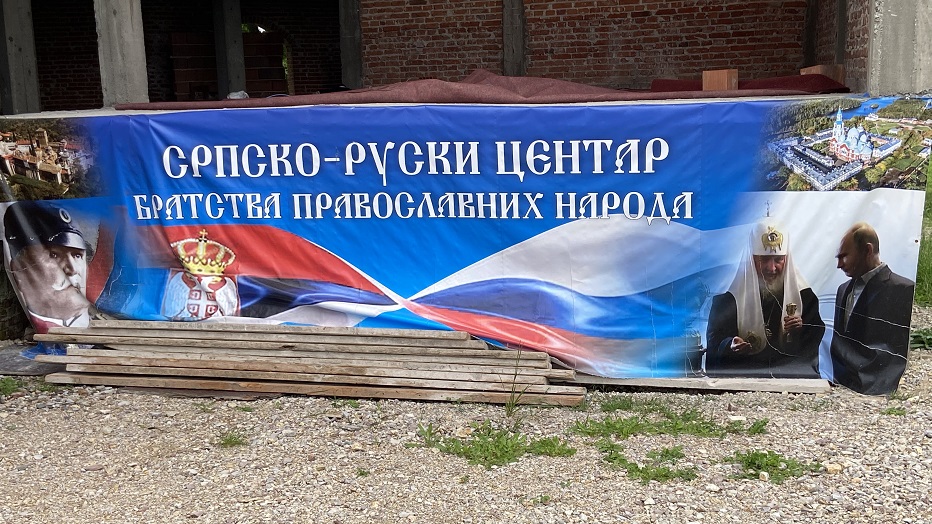
A detail from Ritešići village near Doboja
With more or less intensity work the Association “Serbian-Russian bridge” in Banja Luka and Istočno Sarajevo, the Association of Serbian-Russian friendship “Brotherhood” in Banja Luka and Istočno Sarajevo, Serbian movement “Vladimir Putin” in Istočno Sarajevo, the Association of Serbian-Russian friendship “Zavet” from Bijeljina, the Russian Center of Foundation “Russian Peace” from Banja Luka, Russian Cultural Center in Banja Luka, and the Center of Russian language and culture “Vozroždenije”. The common denominator is that they all are relying on the Serbian Orthodox Church and Orthodoxy as a connection with Russia.
“The main channel of Russian influence in the Balkans – including the cultural one – is the Serbian Orthodox Church. It is the main, but not the only one. The Russian network is pretty wide and branched, and is made of media, corrupt politicians, analysts, NGOs and at last, the useful idiots. The Russian politics – even the cultural one – in the Balkans is primarily destructive. It does not offer any new value. Instead, it evokes feeling of nostalgia after “past, better times”, when allegedly “the order was known”. It is authoritative, episcopal and imperialist, merging within itself both Stalinist and nationalist elements. In its interpretation, which is easily and naturally accepted by the local nationalist and ecclesiastical elites – not only the Orthodox ones, but also the “hard” Catholic one – the West and its culture are a sum of all evils and violations of God’s commandments and traditional moral,”said journalist and writer Andrej Nikolaidis for Žurnal.
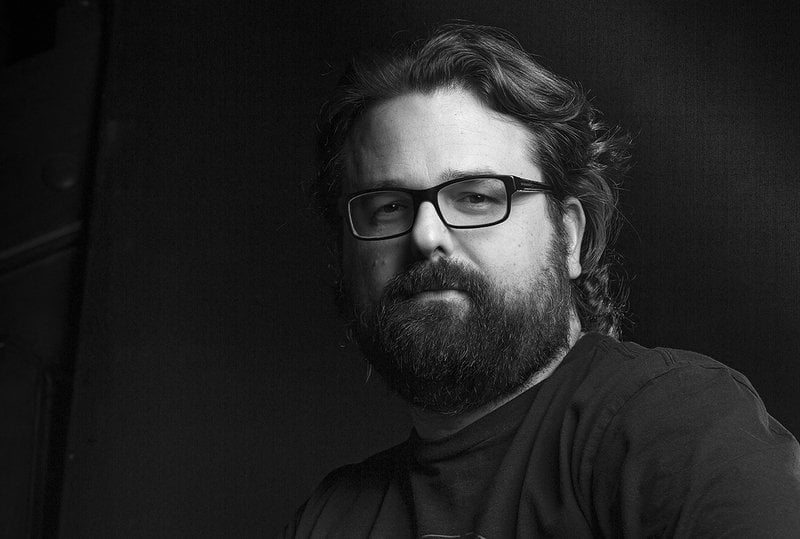
Andrej Nikolaidis
“Night Wolves”, the organization on the US “black list”, is amongst the ones that allegedly under the cover of Orthodoxy and humanitarian work organize tours to make pilgrimages to the monasteries and other places in Bosnia and Herzegovina, Republika Srpska.
Publicly they are promoters of peace and brotherhood amongst the people, whilst in the background they are actually recruitment base for the paramilitary formations in Donbas. Should it even be mentioned that they enjoy support of the Russian president Putin.
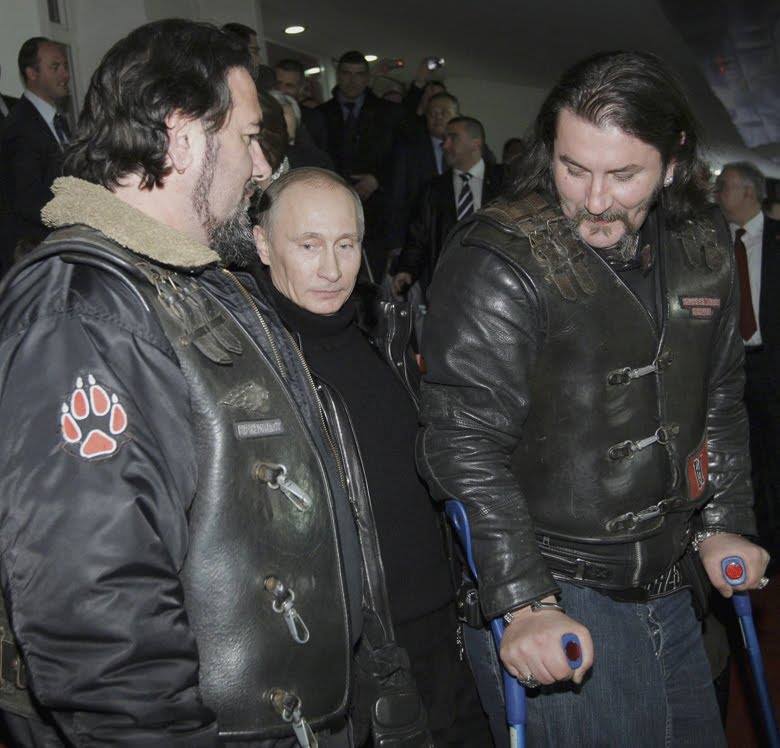
Their leader Alexander Zaldostanov is banned from entering BiH after the assessment that he poses a security treat. This year, seventh time in a row, the Night Wolves have organized a three-day tour without Zaldostanov, going from Brčko to Trebinje, where they attended memorial service for all Serb soldiers fallen since the Battle of Kosovo at the Church of the Holy Transfiguration of God, and they were also guests of St. Vitus day celebration, which is also Saint Patron’s Day of the Army of Republika Srpska and the Third infantry/Republika Srpska/regiment of the BiH Armed Forces!?
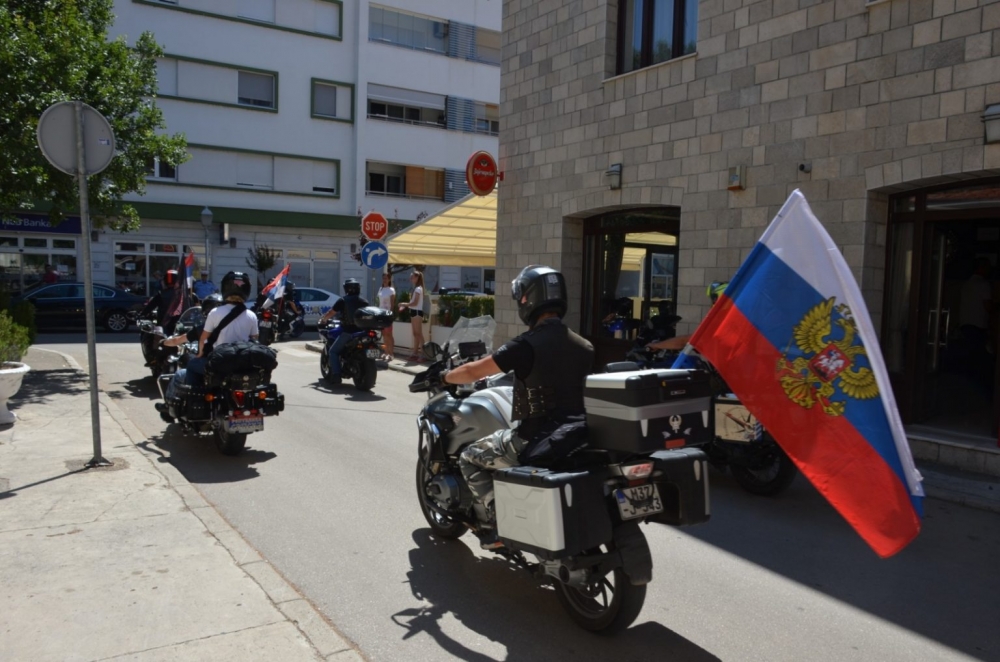
Night Wolves in Trebinje
Certainty of the Russian-Serbian friendship is not reflected only in “the cultural-historical” events under the flag of Orthodoxy, but also in the notion of honoring the victory of antifascism. The mutual support to history revision is present.
Ambassador of the Russian Federation to BiH, Petr Ivancov, had on September 15 supported the newly established joint holiday of Serbia and the BiH entity Republika Srpska – “The Day of Serbian Unity”. In return, the event “March of Immortal Regiment” was “passed off” in Republika Srpska that should celebrate the victory over fascism, the victory of the Red Army and the Yugoslav Partisans, and that was infiltrated by the supporters of the fascist chetnik movement.
“The customs that are completely new, and not even established in Russia, are being majestically introduced by the local politics, hoping that the observance of new practices will lead to homogenization of people. It especially relates to the march of so-called Immortal Regiment. It originated in Russia in 2011, spilled over to Serbia and RS, supported by all significant political factors and media. Only six years after Russia the regiment came to Banja Luka, then to Istočno Sarajevo. The march celebrates unity of chetniks and partisans. However, Russia sees the regiment a bit differently and did not think of celebrating unity of the Red Army soldiers and soldiers of the General Vlasov, who also embraced nationalist and capitalist vicious ideology. There is no cry – “We are all Russians”. You fill find nothing on Vlasov in Russian historiographic, because he is considered the biggest traitor of all,” says Sead Pašić.
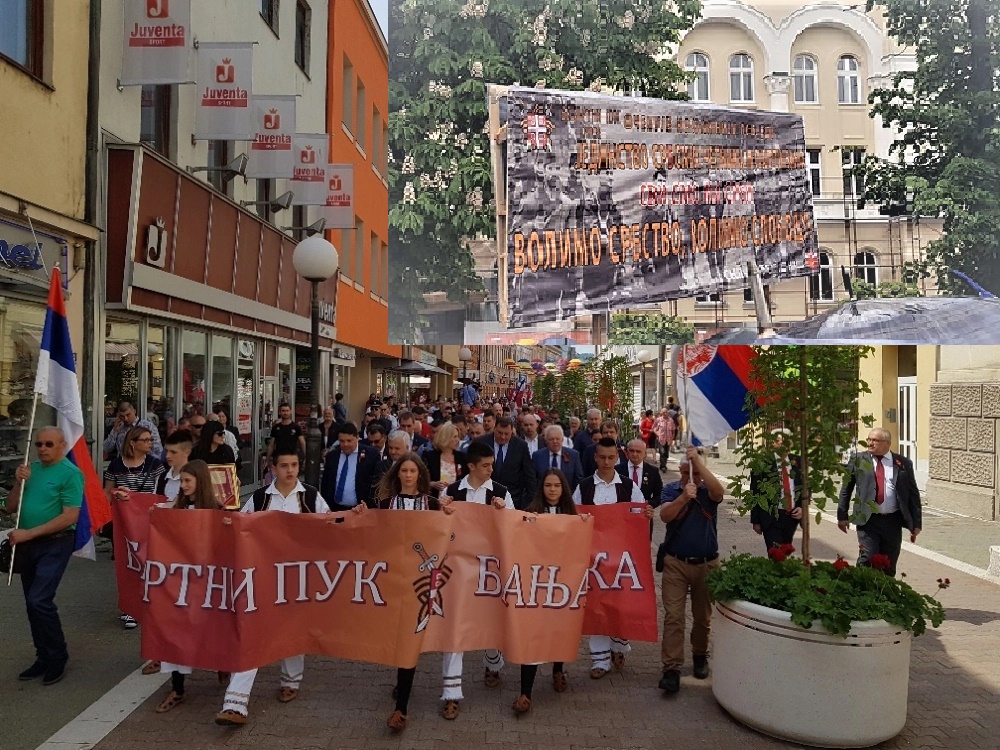
March of Immortal Regiment - Banja Luka photo: buka.com
Petr Ivancov, Ambassador of the Russian Federation to BiH was midway of this year conferred “Order of Friendship” by the decree of the President of Russian Federation, Vladimir Putin. In the official explanation the order was awarded “for significant contribution to the implementation of foreign policy goals and extensive diplomatic experience”. At the same time this can be interpreted as contentment of Russia with the promotion and dissemination of influence in Bosnia and Herzegovina, not only on the territory of Republika Srpska, but also the economic-political one with Croatian Democratic Union BiH and its leader Dragan Čović.
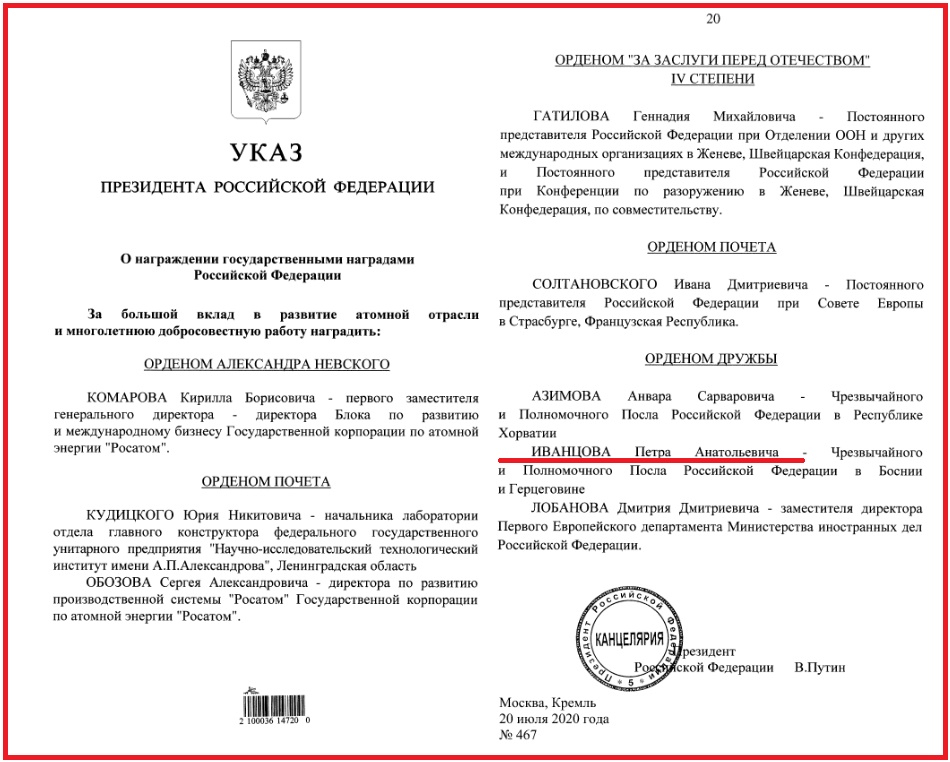
Decree on decoration conferment to Petr Ivancov
A portion of the activities of Russian diplomacy and numerous government and non-government organizations that are connected to Russia and its funds is provision of scholarships for young people from Bosnia and Herzegovina to study in Russia, with note that there are special benefits “for the citizens of Serbia and Republika Srpska”. So was the call to award scholarship published for this academic year as well. It is organized by the Ministry of High Education and Science of Russia, and realized in cooperation with the Agency “Rossotrudnichestvo”.
“No one who is disgusted by the West and sees Putin’s reign of fear as a guard of “Christian” values and culture will not go to Russia to live there. They will all seek better future for them and their children in the West whose culture “disgusts” them. That miserable hypocrisy of the local people is one of the important assumptions of the Russian influence in the Balkans,” believes Andrej Nikolaidis.
“Well yes, it is true that young people, not only from Srpska, but also from the region, go to the EU countries looking for a job. Russia is under sanctions and it affects Russian economy even more than Russians are ready to admit. However, the ties between Serbian and Russian people are sincere and deep, and have been existing since the time immemorial. Serbs love Russians, sincerely celebrate Russia’s geopolitical successes and Serbs feel the love of Russia”, said earlier for Žurnal Predrag Ćeranić, Member of the Council for protection of RS Constitutional Order and dean of the Faculty of Security Sciences Banja Luka.
“The societies of the Serbian-Russian friendship are being established such as “Naisus” that brings together journalists, writers and intellectuals. Russian students are coming tasked to keep the narrative of the almighty Russia alive and constant. The Russian Cultural Center is literally a breath of Russia in Banja Luka and daily delivers axiology, customs and other political and behavioral patterns to the citizens of North Bosnia and East Herzegovina. The reason for its construction was 100th anniversary of death of the Russian imperial family Romanov and it was constructed under the auspice of the church”, reminds Sead Pašić.
Vladimir Putin personally appointed the head of the Agency “Rossotrudnichestvo”, trusted cadre Yevgeny Primakov, grandson of the former Prime Minister of Russia. He is member of the Russian Duma, and was also Putin’s confidant at the 2018 presidential election and is the head of the “Russian humanitarian mission”.
As Žurnal alreadywrote, he represents the “Russian humanitarian mission” as a non-political organization, but nevertheless reminds of his grandfather’s words on the meaning of “soft power” for Russia and importance of humanitarian activities in the Balkans, which in his opinion should “win over the hearts and minds of people”.
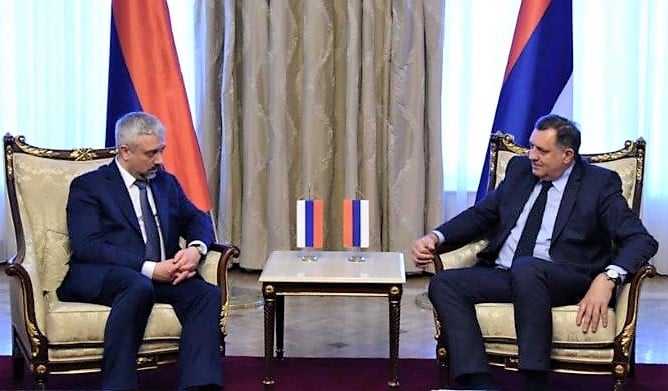
Yevgeny Primakov (left) and Milorad Dodik
“Serbia (the country) and a good portion of Serbians on both sides of Drina River persistently believe in Pan-Slavic mission of Russia. They believe that Russia does everything for some higher, pan-Slavic or better yet, because its sounds more divine, pan-Orthodox goals. And Russia is a national country for a long time already, and it is led exclusively by strategic, and I prefer to say nationalist interest. This interest sometimes entails pandering to (for example Serbian) interest, but only to an extent that serves Russia. Everyone has more or less freed themselves of the prejudice (Polish people primarily), only Serbia and Serbian nationalism remains persistent in that empty, earthly ground faith. Even the Russian opposition came to its senses”, wrote in 2015 dr. Džemal Sokolović, professor of sociology, member of the Norwegian Academic Community and founder of the Institution of Democracy for New Time.
Russia does not separate Serbia, BiH and Montenegro in its projections, since their notion of territory is on a macro level. At the same time, it loves that the citizens of these countries, particularly the Orthodox ones, create an image of Russia as a “mother” who will take care of them in tough times, after natural disasters or the last coronavirus pandemic. The truth is that they do not really give money, but do use all other resources, and lately the Orthodox Church in particular, which an ideal structure to promote mentioned ideas.
The media support should not be neglected in such an approach. Author of this text has analyzed half a year of contents of the evening news of the public broadcaster Radio-Television of Republika Srpska. There were literally no days or evening news without contents dedicated to the activities of the Serbian Orthodox Church.

(zurnal.info)








